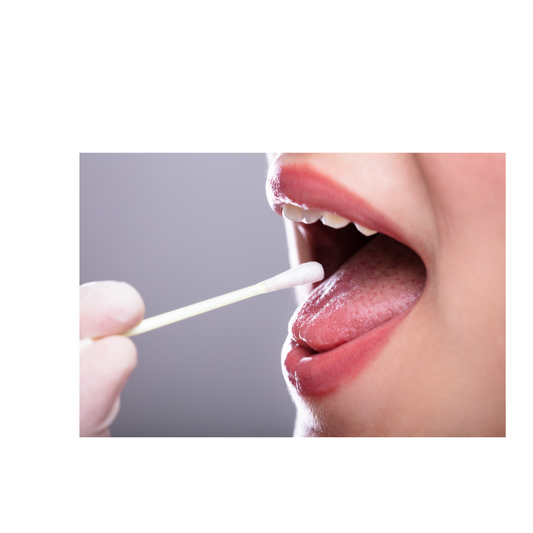Welcome to another edition of Essential Insights. I'm Dr. Shane Cope, DDS, MSD, a seasoned practitioner passionate about integrating holistic health principles into dental care. With over 15 years of experience in periodontics, orofacial pain, and especially oral medicine, my journey has led me to found Essential Health Ventures. Our mission is to enlighten and empower individuals on their path to optimal health, starting with the gateway to our body's health: the mouth.
In today's fast-paced world, stress has become an almost constant companion for many of us. Its effects are widely recognized in terms of mental health, with numerous studies highlighting its link to anxiety, depression, and other psychological conditions. However, what's less talked about is how stress manifests physically, particularly in aspects of health that we might not immediately associate with being stress-related, such as our oral health.
This article sheds light on the often-overlooked connection between stress and oral health. Stress isn't just something that affects our mood or mental state; it can have tangible effects on our physical well-being, including the health of our mouth, teeth, and gums. We'll delve into various oral health conditions directly influenced by stress, such as bruxism (teeth grinding), gum disease, mouth ulcers, and dry mouth. Beyond identifying these conditions, we aim to explore holistic approaches to managing stress. These methods not only improve our mental well-being but can also significantly enhance our oral health.
Join me as we explore the unseen connection between stress and oral health, understand the importance of holistic health practices, and discover practical strategies to manage stress and improve our oral wellness.
Understanding Stress
In its most basic definition, stress is the body's response to any demand or challenge. It can be categorized into two main types: acute stress, which is short-lived and often tied to specific situations that require immediate attention, and chronic stress, which persists over a more extended period, often due to ongoing challenges that seem insurmountable. While acute stress can be beneficial in certain situations, providing the necessary adrenaline to meet deadlines or escape danger, chronic stress is where the real issues lie, affecting our health in myriad ways.
The body's response to stress is rooted in the ancient fight or flight mechanism. When faced with a perceived threat, our bodies release a flood of stress hormones, including adrenaline and cortisol. This hormonal surge increases heart rate, elevates blood pressure, and boosts energy supplies. Initially, this response is meant to protect us, sharpening our senses and preparing us for quick action. However, when the chronic stress of modern life perpetually activates this state, it can wear down the body, leading to a host of physical and mental health issues.
Chronic stress has become a hallmark of modern society, with the American Psychological Association's Stress in America™ survey consistently highlighting its prevalence and impact on health. The effects of chronic stress are far-reaching, impacting cardiovascular health, immune function, and mental well-being. It's also a critical factor in behaviors that compromise health, such as smoking, physical inactivity, and unhealthy eating habits, which further exacerbate its negative impact.
The implications of stress extend beyond these general health concerns, touching on aspects of our well-being that we may not immediately recognize as stress-related, such as oral health. The following sections will delve deeper into how stress affects oral health conditions and explore strategies for mitigating these effects through holistic stress-reduction techniques.
The Connection Between Stress and Oral Health
Stress, while often perceived as a purely psychological issue, manifests physically in numerous ways, including significant impacts on oral health. The stress-induced alterations in our body's normal functions can directly affect the mouth, teeth, and gums, leading to various oral health conditions.
One of the most direct connections between stress and oral health is bruxism, or the grinding and clenching of teeth. This involuntary action, often occurring during sleep, can lead to severe tooth damage, enamel erosion, and even temporomandibular joint (TMJ) disorders. The American Dental Association notes that stress is a common trigger for bruxism, highlighting the need for stress management as part of the treatment plan.
Gum disease, or periodontitis, is another condition where stress plays a significant role. Stress affects the body's immune system, weakening its ability to fight off infections, including those that attack the gums. According to research published in the Journal of Periodontology, individuals under chronic stress are at a higher risk of developing periodontal diseases due to compromised immune responses, making the gums more susceptible to infection.
Mouth ulcers and canker sores also have a notable link to stress. Though not harmful, these painful sores inside the mouth can cause significant discomfort. Studies suggest that periods of high stress can trigger outbreaks of canker sores, pointing to the need for effective stress management to reduce their occurrence.
Dry mouth, or xerostomia, is yet another condition exacerbated by stress. Stress impacts the nervous system's control over saliva production, often reducing it and leading to a dry mouth. This reduction in saliva causes discomfort and increases the risk of tooth decay and gum disease, as saliva is crucial in neutralizing acids and washing away food particles and bacteria.
The relationship between stress and oral health is cyclical. In turn, oral discomfort and diseases can increase stress levels, especially when they affect one's ability to eat, speak, and socialize comfortably. This creates a feedback loop where stress leads to oral health issues, which then exacerbate stress, further complicating both conditions. Breaking this cycle requires a comprehensive approach addressing stress management and specific oral health care needs.
Identifying Stress-Related Oral Health Problems
Recognizing the signs of stress-related oral health issues is crucial for early intervention and preventing long-term damage. Many people may not immediately connect their oral health problems with stress, making awareness and education vital components of holistic health management.
Signs of stress-related oral health issues can vary widely but often include increased tooth sensitivity, jaw pain or discomfort (primarily upon waking), unexplained toothaches, receding gums, and frequent mouth sores. Bruxism, a direct manifestation of stress, might be more challenging to self-diagnose since it often occurs during sleep. However, symptoms such as jaw soreness, headaches upon waking, and noticeable wear on teeth should raise immediate concerns. Similarly, persistent dry mouth not alleviated by increased water intake could signal stress-related disruptions in saliva production.
The American Dental Association advises that while temporary symptoms might be alleviated with home care or lifestyle adjustments, signs of chronic conditions require professional evaluation. For instance, if gum sensitivity persists despite improved oral hygiene or if tooth wear leads to significant sensitivity or pain, these are clear indicators that professional dental assessment is necessary. Additionally, the presence of persistent or multiple canker sores, especially if accompanied by other symptoms of stress, calls for a dental consultation.
Seeking professional help is essential when symptoms persist or significantly impact one's quality of life. Dentists can offer treatments tailored to alleviate these conditions, such as mouth guards for bruxism or specific therapies for gum disease, and refer patients to other professionals for stress management strategies. Recognizing the difference between temporary discomfort and the onset of chronic conditions is crucial. A rule of thumb is that if symptoms persist for more than two weeks despite home care or recur frequently, it's time to see a dentist.
Moreover, dental professionals can perform comprehensive evaluations to rule out other potential causes of symptoms, ensuring that stress-related conditions are accurately diagnosed and appropriately managed. This holistic approach ensures that the symptoms and their underlying causes are addressed, leading to more effective and long-lasting relief.
Holistic Stress-Reduction Techniques
In our fast-paced world, finding effective ways to manage stress is a luxury and necessary for maintaining both overall and oral health. Holistic approaches to stress management focus on treating the mind and body as interconnected entities, recognizing that improvements in one area can positively affect the other. Here's how you can incorporate holistic techniques into your daily routine for long-term wellness:
Mindfulness and Meditation: Prayer, mindfulness, and meditation have been shown to significantly reduce stress levels, promoting a state of calm and focus that benefits the entire body. Research published in the Journal of Periodontology indicates that stress reduction through meditation can help lower the risk of gum disease by improving the body's immune response.
Regular Physical Exercise: Exercise is a powerful stress reliever. It improves your physical health and boosts endorphins, your brain's feel-good neurotransmitters. The American Journal of Public Health has published findings that regular, moderate exercise can enhance the immune system's response to inflammation, including that which affects gum health.
Proper Nutrition and Hydration: A balanced diet rich in vitamins, minerals, and antioxidants can strengthen the body's defenses against stress. Hydration is equally crucial, as water consumption supports saliva production, preventing dry mouth, often exacerbated by stress.
Adequate Sleep: Quality sleep is foundational to stress management. The Journal of Clinical Sleep Medicine highlights that poor sleep can intensify stress responses, worsening conditions like bruxism and gum inflammation. Ensuring 7-9 hours of restful sleep can mitigate these effects.
Breathing Exercises: Deep breathing exercises can activate the body's relaxation response, directly counteracting the stress response. Techniques such as diaphragmatic breathing have been shown to lower cortisol levels, reducing stress and its adverse effects on oral health.
Time Management and Relaxation Hobbies: Effective time management can alleviate feeling overwhelmed, a common stress trigger. Engaging in hobbies and activities that promote relaxation, such as reading, gardening, or crafting, can provide mental breaks necessary for stress relief.
Incorporating these holistic techniques into your daily routine is vital for managing stress and maintaining your oral and overall health. These practices offer benefits beyond stress reduction, contributing to a healthier, more balanced lifestyle. It's important to remember that consistency is critical; making these activities part of your daily life can help ensure long-term wellness and significantly improve your quality of life. Furthermore, integrating these stress-reduction strategies helps manage stress-related oral health issues and enhances your body's resilience against stress, creating a positive feedback loop of health and well-being.
Direct Approaches to Managing Stress-Related Oral Conditions
While holistic stress-reduction techniques are crucial in maintaining oral health, specific direct approaches can also significantly mitigate the impact of stress-related oral conditions. Here are some practical solutions for addressing common stress-induced oral health issues:
Bruxism (Teeth Grinding):
For those grappling with bruxism, particularly at night, one of the most effective solutions is the use of mouthguards. These devices, custom-fitted by dental professionals, help to protect teeth from the damage caused by grinding and clenching. The Journal of the American Dental Association reports that mouthguards not only prevent tooth wear but also reduce the jaw muscle activity that contributes to bruxism. Incorporating stress-reduction techniques before bedtime, such as meditation or listening to calming music, can help minimize nighttime teeth grinding.
Gum Health:
Improving gum health in the face of stress begins with diligent oral hygiene. Brushing twice a day with fluoride toothpaste, flossing daily, and using an antimicrobial mouthwash can significantly reduce the risk of gum disease. Regular dental check-ups are paramount; professional cleanings can remove plaque and tartar build-up, preventing periodontal disease. A study in the Periodontology 2000 journal highlights the importance of professional dental care in maintaining optimal gum health, especially for individuals experiencing stress.
Dry Mouth and Ulcers:
For those suffering from dry mouth, a condition often exacerbated by stress, staying well-hydrated is critical. Drinking plenty of water throughout the day helps maintain moisture levels in the mouth. Avoiding irritants like tobacco, alcohol, and spicy or acidic foods can also alleviate symptoms. Opting for gentle, all-natural, preservative, and alcohol-free oral care products can prevent further irritation. Additionally, Essential’s Daily Oral Health Supplement offers a natural remedy for preventing ulcers. Its all-natural formulation, rich in vitamins and minerals like L-lysine and alpha lipoic acid, supports oral health and helps protect against the development of mouth ulcers.
Incorporating these direct approaches into your oral care routine can significantly reduce the impact of stress on your oral health. While managing stress through holistic techniques addresses the root cause, these practical solutions provide immediate relief and protection for your teeth, gums, and oral cavity. Remember, consistent care and regular consultations with dental professionals are vital for keeping stress-related oral health issues at bay.
Conclusion: Bridging Stress Management and Oral Health for Holistic Wellness
As we've explored throughout this article, the connection between stress and oral health is profound and multifaceted. Stress not only exacerbates conditions like bruxism, gum disease, dry mouth, and ulcers but also creates a cyclical pattern where oral health issues further increase stress levels. This reciprocal relationship underscores the importance of addressing both stress and oral health to safeguard your overall well-being.
The key takeaway is the necessity of incorporating holistic stress-reduction techniques into your oral health care routine. Practices such as mindfulness, regular physical exercise, proper nutrition, and adequate sleep don't just alleviate stress; they also create a foundation for more robust oral health and, by extension, a healthier life. By managing stress effectively, you can prevent or mitigate many oral health issues that stress can cause or worsen.
Moreover, direct approaches to managing stress-related oral conditions—such as using mouthguards for bruxism, maintaining rigorous oral hygiene for gum health, and choosing gentle, natural products like Essential's Daily Oral Health supplement for dry mouth and ulcers—offer practical solutions to these challenges. These strategies, coupled with regular dental check-ups, form a comprehensive plan for keeping your mouth healthy and stress at bay.
In addition to these personal practices, the support of a community can be invaluable. Sharing experiences, challenges, and successes with others who understand what you're going through can provide practical advice, much-needed encouragement, and empathy. To this end, we invite you to join our Facebook Group, a supportive community for individuals grappling with chronic oral conditions. Here, you can find a safe space to discuss your experiences, gather encouragement, and learn from the collective wisdom of others navigating similar journeys.
Remember, managing stress and maintaining oral health are continuous processes that require attention and care. By integrating holistic stress-reduction techniques into your daily routine and being proactive about oral health, you can navigate these challenges more effectively, leading to improved well-being and a higher quality of life. Let's not overlook the power of community support in this journey; together, we can achieve a healthier, more balanced lifestyle.
Join the Conversation and Discover Effective Solutions
Connect with Our Community
Are you navigating the challenges of dry mouth and seeking support and insights? We invite you to join our vibrant Facebook group, a space where you can share your experiences and learn from others dealing with similar issues. It's a community where knowledge, tips, and personal stories about managing dry mouth are exchanged freely. Don't navigate this journey alone; become part of a supportive network that understands your struggles.
Explore More Resources
We also encourage you to delve into our wide range of resources and articles dedicated to effective oral health management. Our website is a treasure trove of information, offering guidance, tips, and the latest findings in oral health care. Whether you're looking for in-depth articles, practical advice, or the latest trends in oral health, our resources are here to enlighten and guide you.
Try Essential's All-Natural Dry Mouth Solutions
And if you're looking for a gentle yet effective way to combat dry mouth, explore our selection of all-natural products. Essential's Dry Mouth Spray, formulated with the goodness of nature, is designed to provide you with the relief you need without the harsh chemicals. It's more than just a product; it's a step towards a healthier, more comfortable daily life. Experience the difference that natural ingredients can make in managing dry mouth.
Your journey to better oral health starts here. Join our community, explore our resources, and try Essential's Dry Mouth Spray. Together, let's find the solutions that work best for you. Visit us now and take the first step towards a more comfortable and healthier smile. 🌿🦷





